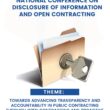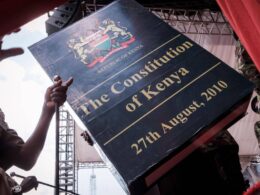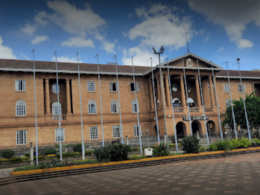By Geoffrey Odhiambo
The culture of secrecy has perforated Kenya’s public projects for the longest time. Citizens have seemed to have no opportunity to interrogate the crux of the agreements signed between the government and service providers in small and mega projects. In the end, no one can have accurate knowledge and a voice to raise accountability questions where projects fail to guarantee value for money and meet the standards of public service delivery due to a lack of access to information. Any attempt to acquire data through information requests and court orders is treated with contempt and a carte blanche mentality. With a public procurement system that has remained opaque, transparency in public projects continues to be a mirage, as the taxpayer lives to suffer the consequences of unfair business practices, fraud, collusion, and corruption in public contracting.
Kenya has been on an economic development spree since the launch of the Vision 2030 blueprint in 2008. We have witnessed the successful realisation of the Thika superhighway—a multi-billion project that is now proving to be the exception rather than the norm. On the other hand, mega projects such as the Managed Equipment Services (MES), the Galana-Kulalu irrigation, and Standard Gauge Railway (SGR) have experienced severe challenges, including misuse of public coffers and failure to meet value-for-money thresholds.
Article 10 of the Constitution unequivocally enumerates the national values and principles of governance that should bind all State organs, State officers, and public officers when applying the constitution, enacting or interpreting any law, and making or implementing public policy decisions. The values and principles are, among others, democracy and public participation, good governance, integrity, transparency, and accountability. Further, Article 201 of the Constitution recognises the principles of openness and accountability, including public participation in financial matters. It obligates the government to use all public money prudently and responsibly.
Regarding the procurement of public goods and services, Article 227 provides that all State organs or any other public entity contracts for goods or services must be made in accordance with a fair, equitable, transparent, competitive, and cost-effective system. In a country with such robust constitutional foundations and other enabling legislation, there is a legitimate expectation that all government processes, including procurement of public goods and services, are transparent from the initial stages of a project. Making relevant data available to the public through proactive disclosure of the information gives citizens the right tools to participate meaningfully in the decision-making of any public project and hold the government accountable where any misappropriation of funds and projects falls below the expected standards.
Proactive Disclosure of Information
Making information accessible gives individuals the data and knowledge they require to participate effectively in the democratic process in any politicised society. A well-informed populace is more likely to contribute to the economic development of any country. It may also guard against corruption-related practices within the public service delivery sectors.[1]
Before promulgating the 2010 Constitution, Kenya struggled with a lack of government transparency due to inadequate legal and policy underpinnings on access to information and proactive disclosure of information. The situation was further riddled with diminished value for money audits in public projects, poor service delivery, misappropriation of funds, and lack of an environment that promotes fair business practices leading to fraud, collusion, and corruption in public contracting.
The Kenyan Constitution 2010 heralded a new dawn toward improving transparency, accountability, and public service delivery. Article 35 (3) of the Constitution provides that ‘The State shall publish and publicise any important information affecting the nation.’ This provision obligates the State to disclose any information affecting the public proactively. The requirement is further elaborated and concretised by the Access to Information Act 2016, which requires public entities to make certain categories of information available to the public.
Further, the Constitution of Kenya enshrined citizen engagement and transparency in policy-making in Kenya. The country demonstrated its commitment to these ideas and the international community through participation in the Open Governance Partnership. Through the Kenya Open Data Initiative, Kenya became the first Sub-Saharan African country to open government data. The government largely shepherded the process of creating the First National OGP Action Plan, culminating in Kenya hosting the First OGP Africa Regional Meeting in May 2013.[2]
Kenya has also made fundamental policy declarations, such as commitments under the Open Government Partnership, National Action Plan (NAP) III 2019, NAP 2020-2022, and Executive Order No. 2 of 2018. Despite the robust legal and policy underpinnings, transparency in public procurement remains a crucial challenge within the Kenyan public sector. It is further exacerbated by the culture of secrecy, bureaucracy, and reluctance to disclose information proactively.
ICJ Kenya’s Experience
In 2021, ICJ Kenya trained community monitors on access to information. It commissioned them to monitor select contracts in the target sectors to provide a basis for assessing the level of disclosure by specific agencies. That was followed by writing twelve (12) information requests to various public health and education entities following our community monitoring initiative. Unfortunately, none of the institutions gave any feedback within the statutory timeline of 21 days. After several follow-ups, only one institution responded four months later by sharing scanty information and ignoring our request for the contract of the monitored project.
ICJ Kenya developed a Community Monitors’ Report on the disclosure of information in Nairobi and Machakos Counties. The report captures several challenges; unwillingness by public officials to share information, delays, and bureaucracies in relaying information, and a general lack of goodwill by public officers to disclose information proactively. While Kenya has committed to adhere to Open Data Contracting Standards (OCDS) under the Open Governance Partnership (OGP) Initiative, there are still gaps in entrenching best practices concerning the disclosure of data and documents at all stages of the contracting process and access to information in most public institutions.
Further, ICJ Kenya has been building the capacity of the media, Community Based Organizations, and Civil Society Organizations on open contracting and access to information through training workshops. It has also created awareness of the subject through radio interviews and community engagements in Nairobi and Machakos Counties. The organisation has also engaged public officials in the health and education sectors on the need to make crucial information about government projects available.
The Turning Point
On 6 November 2022, the government of Kenya, through the Cabinet Secretary (CS) of the Ministry of Transport, Infrastructure Housing, Urban Development, and Public Works, Kipchumba Murkomen, made public the elusive SGR contract. It was circulated through the CS’ official Twitter handle. The unprecedented action to make the contract public eleven (11) years after the signing of the agreement with the Export-Import Bank of China that financed the project is analogous to missing the boat. Kenyans lost the opportunity to audit the project’s value for money and assess whether they needed to spend 5 Billion shillings in the first place. However, the announcement by the government should be a new beginning for Kenya. It bolsters the necessity to make relevant documents and contracting information available for public scrutiny at all project stages.
While the SGR contract could have been made available after the award of the tender in 2011 to allow for citizens’ inspection, the fact that the government has made it public is laudable. We may not control past events, but the disclosure of the contents of the SGR contract is a good precedent for future public projects. It is a gain that must be reinforced to ensure that as long as public documents meet the threshold of Article 35 of the Constitution of Kenya and the Access to Information Act 2016, the government should disclose them proactively.
Moving forward, the national and county governments should advance mainstreaming of policies on open contracting, using the Open Contracting Data Standards (OCDS), embrace proactive disclosure of information within their departments and public service delivery processes, and encourage citizens’ demand for information from public entities. It will increase contracting transparency and allow a more significant analysis of contracting data by the public to hold public officers accountable if projects fail to meet the required standards due to unfair business practices, fraud, collusion, or corruption.
Geoffrey Odhiambo is a programme officer at the Kenyan Section of the International Commission of Jurists (ICJ Kenya). He is a lawyer interested in constitutional law, human rights, research, public interest litigation, and access to justice.
[1] Article 19. Kenya: Realising the Right to Information. Available at
[2] The OGP story in Kenya: Building Political Will for Open Government. Available at https://www.opengovpartnership.org/stories/the-ogp-story-in-kenya-building-political-will-for-open-government/












